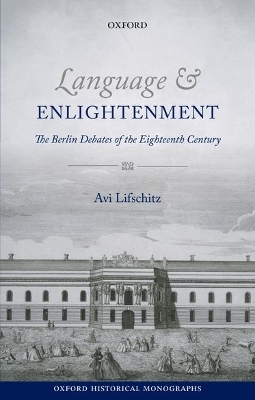
Language and Enlightenment
Oxford University Press (Verlag)
978-0-19-877764-9 (ISBN)
What is the role of language in human cognition? Could we attain self-consciousness and construct our civilization without language? Such were the questions at the basis of eighteenth-century debates on the joint evolution of language, mind, and culture. Language and Enlightenment highlights the importance of language in the social theory, epistemology, and aesthetics of the Enlightenment. While focusing on the Berlin Academy under Frederick the Great, Avi Lifschitz situates the Berlin debates within a larger temporal and geographical framework. He argues that awareness of the historicity and linguistic rootedness of all forms of life was a mainstream Enlightenment notion rather than a feature of the so-called 'Counter-Enlightenment'.
Enlightenment authors of different persuasions investigated whether speechless human beings could have developed their language and society on their own. Such inquiries usually pondered the difficult shift from natural signs like cries and gestures to the artificial, articulate words of human language. This transition from nature to artifice was mirrored in other domains of inquiry, such as the origins of social relations, inequality, the arts, and the sciences. By examining a wide variety of authors - Leibniz, Wolff, Condillac, Rousseau, Michaelis, and Herder, among others - Language and Enlightenment emphasises the open and malleable character of the eighteenth-century Republic of Letters. The language debates demonstrate that German theories of culture and language were not merely a rejection of French ideas. New notions of the genius of language and its role in cognition were constructed through a complex interaction with cross-European currents, especially via the prize contests at the Berlin Academy.
Avi Lifschitz is Senior Lecturer in European History at University College London (UCL). He has held research fellowships at the Wissenschaftskolleg in Berlin, the Lichtenberg-Kolleg at the University of Göttingen, and the Clark Library at UCLA. He is editor of Engaging with Rousseau (2016) and co-editor of Epicurus in the Enlightenment (2009).
Introduction
1: The mutual emergence of language, mind, and society: an Enlightenment debate
2: Symbolic cognition from Leibniz to the 1760s: theology, aesthetics, and history
3: The evolution and genius of language: debates in the Berlin Academy
4: J. D. Michaelis on language and vowel points: from confessional controversy to naturalism
5: A point of convergence and new departures: the 1759 contest on language and opinions
6: Language and cultural identity: the controversy over Prémontval's Préservatif
7: Tackling the naturalistic conundrum: instincts and conjectural history to 1771
8: Conclusion and a glimpse into the future
| Erscheinungsdatum | 29.02.2016 |
|---|---|
| Reihe/Serie | Oxford Historical Monographs |
| Verlagsort | Oxford |
| Sprache | englisch |
| Maße | 140 x 216 mm |
| Gewicht | 316 g |
| Themenwelt | Geschichte ► Allgemeine Geschichte ► Neuzeit (bis 1918) |
| Geisteswissenschaften ► Geschichte ► Regional- / Ländergeschichte | |
| Geisteswissenschaften ► Philosophie ► Erkenntnistheorie / Wissenschaftstheorie | |
| Geisteswissenschaften ► Sprach- / Literaturwissenschaft ► Sprachwissenschaft | |
| Sozialwissenschaften | |
| ISBN-10 | 0-19-877764-7 / 0198777647 |
| ISBN-13 | 978-0-19-877764-9 / 9780198777649 |
| Zustand | Neuware |
| Haben Sie eine Frage zum Produkt? |
aus dem Bereich


